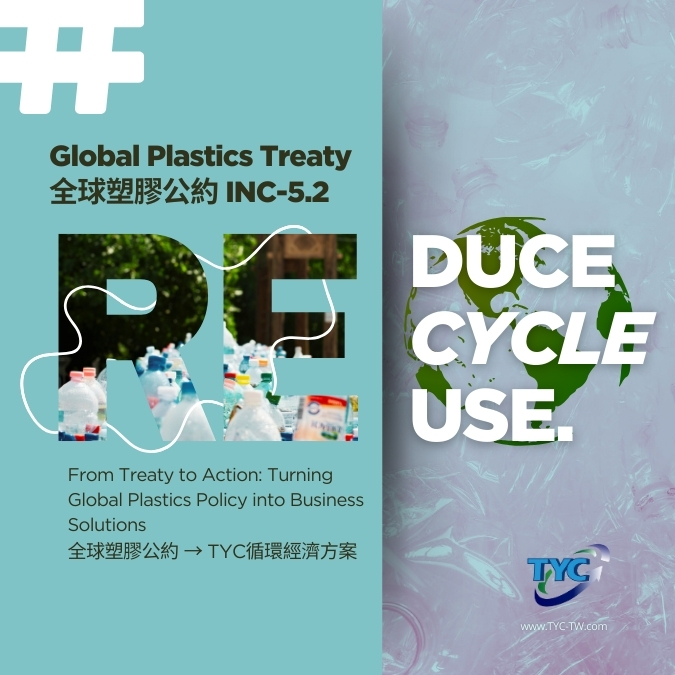- Home
- News
- ESG Weekly News
- ♻️ Global Plastics Treaty INC-5.2 Update | Insights from TYC
♻️ Global Plastics Treaty INC-5.2 Update | Insights from TYC

♻ Global Plastics Treaty INC-5.2 | Insights from TYC
🌍 International Negotiation Update
On Aug 15, 2025, the Global Plastics Treaty INC-5.2 concluded in Geneva with 184 countries and 3,700+ participants. While no consensus was reached, the revised draft highlighted several key directions:
▪️ Extended Producer Responsibility (EPR) → requires manufacturers, brand owners, and importers to take responsibility for the entire lifecycle of products, especially post-consumer collection and recycling, driving recyclable design and take-back systems
▪️ Conference of the Parties (COP) → will define priority product bans, initially focusing on intentionally added microplastics and certain single-use plastics
▪️ Environmentally sound waste management → aligned with the Basel Convention framework
▪️ Remediation & just transition → balancing sustainability with industry fairness
🇹🇼 Why Choose Taiwan as Your Sustainable Supply Chain Partner
Taiwan’s circular economy policies are already highly aligned with the spirit of the Global Plastics Treaty, supported by robust regulations and government oversight:
-
Clear regulatory framework & traceability
All recycled material sources are registered, reviewed, and monitored under the Ministry of Environment, ensuring legal compliance, source transparency, and traceability. For global brands, this reduces compliance risks and builds supply chain trust. -
Efficient recycling system: the 4-in-1 model
Taiwan’s unique “4-in-1 Resource Recycling System” (government, communities, recyclers, and a recycling fund) ensures controlled waste flows. Combined with a subsidy fund mechanism, it delivers one of the world’s highest recycling rates and maintains consistent quality of recycled materials. -
Policy-driven reduction and design standards
Taiwan enforces phased single-use plastic reduction milestones and implements the 4S Green Design principles(pure material, natural color, minimal labeling, tethered caps), requiring products to be designed for recyclability at the source. -
International collaboration and marine waste management
Beyond domestic systems, Taiwan launched the Marine Waste Recycling Alliance and participates in the Indo-Pacific regional cooperation platform, sharing technical know-how and best practices globally, reinforcing its role as a responsible sustainability leader.
📌 Conclusion
Taiwan has built a recycling ecosystem that is well-regulated, transparent, and reliable — making it one of the most trustworthy bases for global sustainable supply chains.
🚀 What TYC Delivers
TYC helps brands and supply chains turn policy into practice:
1️⃣ Compliant & traceable recycling
2️⃣ High-performance recycled resins (HDPE, LDPE, PP) with full technical data
3️⃣ Circular product design → upgrading materials into building, packaging, and industrial applications
4️⃣ Carbon impact reporting (ISO 14067/14068) to support ESG & net zero goals
5️⃣ EU/US compliance → building resilient, sustainable supply chains
📌 Key Insight
The Global Plastics Treaty will make EPR (Extended Producer Responsibility: producers accountable for post-consumer recovery), recycling responsibility, and traceability baseline requirements for supply chains.
👉 Partnering with TYC means transforming policy frameworks into actionable business models — strengthening compliance and competitiveness.
✨ Call-to-Action
TYC invites global brands and supply chain partners to co-create circular economy solutions. From Taiwan to the world, we bring sustainable value through circular innovation.
🔗 More: https://www.tyc-tw.com/news/detail/150
Resource:Taiwan Ministry of Environment News
#GlobalPlasticsTreaty #CircularEconomy #PlasticRecycling #TYC #Sustainability #WasteToBeauty #ESG #ClosedLoop #B2B
